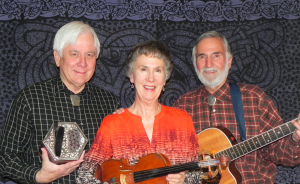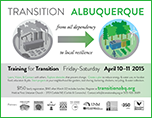Breaking Bueno: Working for a Resilient Albuquerque
Friday-Saturday, 10-11 April 2015
First Unitarian Church
What:
Transition from our Oil Dependency to a Vibrant, Healthy Life in Albuquerque
How:
Develop a process to create resilience and sustainability
Who:
Grass roots organizations, individuals, community leaders already in action, students, activists, people who want to demonstrate a conscious life style in Albuquerque
Why Transition Training?
- Learn ways of creating a positive, shared vision for Albuquerque’s future
- Receive tools for community outreach, education and engagement
- Learn how to summarize the three crises of Climate Change, the Economic Slump, and Drought in simple ways that move people to positive action.
- Explore the obstacles that have prevented our city, county, state from recognizing and positively responding to the challenge of energy transition.
- Start programs in your neighborhoods (community gardens; tool sharing; barter, local businesses, chickens, water collection & recycling, public transportation, emergency response in Albuquerque).
- Connect with other communities, congregations, and organizations in New Mexico, and in the US, who are taking their future in their hands.
- Create a plan to reduce dependence on oil and create a sustainable Albuquerque (enough clean water for food, grandchildren).
- Become a part of a rapidly growing positive, inspirational, global movement!

Doug Cowan and Steve Miller are two Celtic Coyotes. Sometimes as many as 5 Coyotes make Celtic music together. Friday evening, at the Transition Workshop at First Unitarian Church in Albuquerque, Doug and Steve will be joined by Steve’s sister, Marilyn O’Boyle, on the fiddle. Marilyn is a frequent enough guest fiddler to actually be considered another Coyote. She’ll be part of the group again at the Celtic Festival on May 16.
Curriculum:
The course describes how to set up, run, and sustain a successful Transition Initiative. It is packed with imaginative and inspiring ways to engage your community, and delves into both the theory and practice of Transition that has worked so well in dozens of communities in the U.K. and U.S.
Facilitators:
T4T Trainers Maggie Seeley (Transition ABQ), Mark Juedeman (Transition Houston); Kat Steele (Transition Big Sur); brilliant community leaders, citizen experts, and students from New Mexico.
Location:
At the First Unitarian Church Social Hall, 3701 Carlisle Blvd NE, Albuquerque, NM 87110 (Comanche & Carlisle. See map here.)
Schedule:
Friday, 10 April
8:30 |
Registration – Welcome |
9:00 |
Welcome |
9:20 |
Introductions |
9:35 |
Speaker – Dr. Bruce Milne, Director of UNM Sustainability Studies Scarcity or Abundance: Your Choice Introduction to “The Method” |
10:30 |
Break |
10:35 |
Four (4) Key Assumptions of Transition + Seven (7) Principles – Valerie Smith & Elaine Goings |
10:45 |
Twelve (12) Steps/Ingredients of Transition – Marilyn O’Boyle |
11:15 |
Mark Juedeman, Transition Houston, Texas Transition 101: How does Transition look in other communities |
12:00 |
Lunch – Pick up lunch and eat outdoors Visit LEED Platinum Building, Pollinator Garden, and Solar Array at UU Church |
1:10 |
Speed Networking – Tom Stark |
1:40 |
Visioning – Maggie Seeley |
2:40 |
*Open Space – Maggie Seeley What are the challenges of creating a Sustainable Albuquerque? |
4:00 |
Plenary – Presentations from groups |
4:50 |
Wrapping Up – Wayne Evelo and Pily Rodriquez |
5:00 |
Conclusion |
6:00 |
Potluck, Exhibits, Music by the Celtic Coyotes |
Saturday, 11 April
8:30 |
Coffee & Networking |
9:00 |
Check-Ins & Day 2 Agenda – Leila Salim |
9:20 |
Psychology of Change – Maggie Seeley |
10:40 |
Break |
10:45 |
Inner Transition (Heart and Soul) – Mark Juedeman & Maggie Seeley |
12:00 |
Check in with Parking Lot issues – Linda Doherty |
12:15 |
Lunch – Pollinator, LEED and Solar tours repeat |
1:25 |
*Open Space – Maggie Seeley, Valerie Smith & Wayne Evelo What steps do we take now to create a Sustainable Albuquerque? |
3:00 |
Plenary – Report Back; Actions & Accountability |
3:15 |
Break |
3:30 |
Work Groups form around key issues – Marilyn O’Boyle What one change, action would make all the difference in our lives? What are we gladly looking forward to doing? Within 3 days, 7 days, 14 days? |
4:45 |
Moving forward from here – Leila Salim How do we stay in touch and communicate? |
5:00 |
Closing – Alex Pogzeba |
5:30 |
Celebrate – Wine & cheese reception |
Cost:
$150 per person
$110 for Seniors (60+)
$75 for Students
Food, refreshments, and materials included.
A 50% deposit will hold your place. Remaining amount must be paid by April 6.
Lodging not included – local folks may be willing to host.
Limited partial scholarships are available.
Suggested Reading:
- The Transition Handbook: From Oil Dependency to Local Resilience, by Rob Hopkins (free download here)
- Transition Primer (free download here)
Suggested Viewing:
- Transition 2.0: https://www.transitionnetwork.org/transition-2
- The Power of Community: How Cuba Survived Peak Oil
- Crude Impact or A Crude Awakening: The Oil Crash
Registration is now closed for the Training event. You may still attend as a walk-in with cash or check in hand, however you would have to bring your own lunches.

